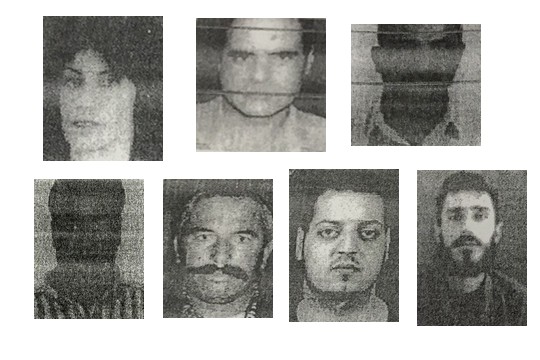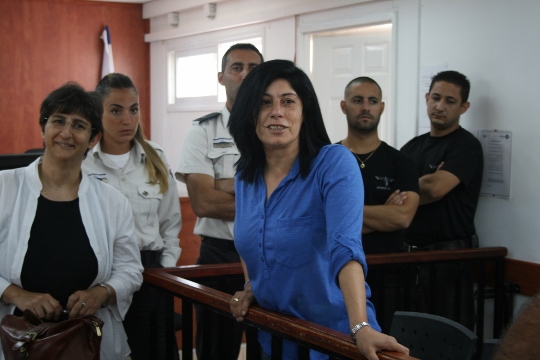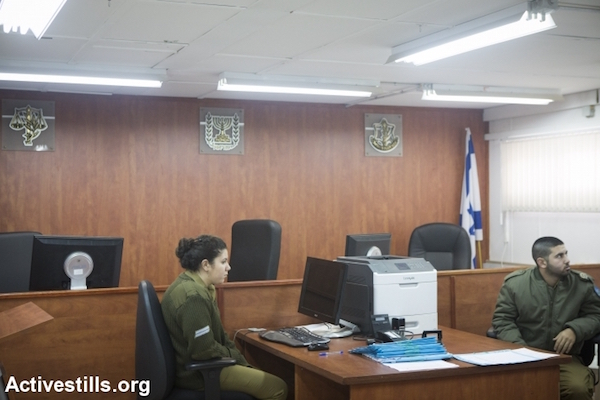Palestinian MP Khalida Jarrar’s trial in Israeli military court has lasted more than six months. When the judge threatened to release her, the military prosecution said it would simply throw her back in administrative detention.
By Avi Blecherman
I’ve been in a few court hearings in my day. I’ve also seen a fair number of Law & Order episodes, and I’d like to think I have a pretty good idea of what a lineup of suspects is supposed to look like, be it an in-person or photo lineup. But nothing could have prepared me for the lineup I saw earlier this week during the trial of Palestinian member of Parliament Khalida Jarrar.
During his interrogation, the prosecution’s key witness was presented with seven photos. Six of the photos were of men. See if you can pick out which one of the photos is of the female Palestinian parliamentarian currently on trial?

The trial of Khalida Jarrar, an elected representative of the PFLP, has been going on for several months now at the Israeli army’s Ofer military court in the West Bank. Jarrar is on trial for 12 counts of membership and activism in her political party, which Israel has declared as an illegal organization. Almost all of the charges deal with her parliamentary activities, like participating in demonstrations, giving interviews to the media, visiting solidarity tents for prisoners and delivering speeches. The final charge is for incitement to kidnap soldiers, but the witness to that alleged incitement says he’s not sure he actually heard Jarrar speak the inciting words she is accused of speaking.
The trial has received significant international attention. Representatives of the European Union and human rights organizations have attended most of the trial in order to monitor the proceedings. The trial itself is only taking place because international pressure was put on Israel for initially holding Jarrar in administrative detention — imprisonment without trial. Palestinians in the West Bank are subject to military law and are brought before military tribunals instead of civilian courts. There has been a fair amount of criticism of the prosecution’s conduct in the case, which I began to understand when I attended a hearing of the trial on Sunday.
There is something unnerving about reading the strange charge sheet, which, as I said, includes giving media interviews. Jarrar has been imprisoned since last March, despite her senior position which one might mistakenly think the Israeli military judge or prosecution might take into consideration. But the worst part is the army’s embarrassing evidence and the military prosecution’s foot-dragging in the case.
The ‘interrogation’
The prosecution’s case seems to rest on a single Palestinian witness who allegedly heard Jarrar call for the kidnapping of Israeli soldiers during a public event in 2012, according to a statement he gave during a Shin Bet interrogation. (The Shin Bet has been known to use torture and physical and mental pressure during its interrogations.) When he was called to the stand to testify, however, a number of holes, contradictions and falsehoods were revealed in his version of events.
So on Sunday, the prosecution called another witness, a police investigator, to testify about interrogating the first witness — after he was already interrogated by the Shin Bet. His testimony revealed a very technical process, not quite an interrogation, in which the officer translated the statement obtained by the Shin Bet into Arabic and then back into Hebrew for the Palestinian witness to sign. Not quite an interrogation.
Parents these days…

“You spoke previously about your many years of experience as an investigator and about the professional methods you use in interrogations,” defense attorney Mahmoud Hassan posed to the police investigator. “What I am hearing here is something entirely different. An entirely technical process of Arabic transcription, not an interrogation. This is simply a copy/paste of a Shin Bet interrogation, without any investigatory activity by you. It’s identical.”
“Why, for instance, didn’t you ask about the call to kidnap soldiers? How is it that you were satisfied with a short, non-specific statement from the witness that he heard her call for kidnappings?” the defense attorney asked. “It wasn’t important to you to detail that central point in the indictment — what exactly it is that was said?”
“No,” the officer responded on the stand. “I was satisfied with what he said in the Shin Bet interrogation. I assume that if he wanted to expand on the matter that he would have done so.”
What happened next completely flabbergasted every last person in court that day.
The officer was asked about the photo lineup he presented to the Palestinian witness, the only witness, who was asked to point to the suspect given seven photos to choose from.
“Tell me about this lineup,” the defense attorney asked.
“I presented him with seven random photos, among which was a photo of the suspect, and he was asked to identify her from [the array],” the officer answered.
“And is it true that of the seven photos, six were of men and the only photo of a woman was that of the suspect?
“I don’t remember anymore. It was a long time ago.”
“Let me help you jog your memory. I’ll read to you the names and you can tell the court whether it is the name of a man or a woman. The first name is Yakub. Is that a man’s name or a woman’s name?” (Editor’s note: Yakub is the Arabic version of Jacob.)
“I don’t know,” the officer shot back. “Parents these days give boys names to girls and vice versa.”
“So let’s take a look at the photograph. What do you see? A man or a woman?”
“It’s somebody who looks like a man…”
The defense attorney presented to the court seven photographs, which, sure enough, wereof six men and the seventh photo was of Khalida Jarrar. That’s what passes for a photo lineup according to Israel’s finest.
The judge laughed out of embarrassment. The prosecutor fell silent with humiliation. The defense attorney emphasized that the photo lineup was an identical copy of the array that the Shin Bet used to get the witness to finger the suspect, Mrs. Jarrar.
In light of the police officer’s troubling testimony the defense asked to call the Shin Bet interrogator to testify in court, but the prosecutor dragged his feet again. They previously claimed he was unavailable because he was out working in the field, another time they claimed he was on vacation.
A disposable trial

The judge censured the prosecution twice during the hearing on Sunday for dragging on the legal process for so long — more than six months so far. “I’ve never seen a trial go on for this long,” said Lt.-Col. Zvi Heilbron, deputy president of the military court. “You have a long list of witnesses. Very few have testified and each time there are delays, cancellations, lateness, witnesses who don’t show up. I intend to allot no more than three or four more hearings for this case. At this pace we will be forced to release [the defendant].”
Then the prosecution pulled a joker out of its deck of cards. If that occurs, the prosecutor shot back at the judge, we will be forced to abandon the criminal process and bring back our original request to hold the defendant in administrative detention.
In other words, the prosecutor threatened that if the court decides to release Jarrar, after she has been in prison for more than six months, the army will send her to prison for even longer without burdening itself with an indictment, a trial, or even a release date. As far as the prosecution is concerned, it doesn’t make much of a difference whether there is a trial or not — just so long as Mrs. Jarrar stays behind bars.
Jarrar’s attorney, Mahmoud Hassan, described the whole process as “a pointless political trial. The indictment is ridiculous. The entire process is vindictive.”
In all of her years as a legislator, Jarra pushed for joining the Rome Statute, her attorney noted, the founding charter of the International Criminal Court, which Palestine joined earlier this year. Israel is worried that its officials might face war crimes charges as a result.
“She also worked to promote a boycott of Israeli goods in Europe,” he added, arguing that Israel is using its military prosecution to take revenge against Jarrar for her use of legitimate political tools. According to Hassan, the foot-dragging is an attempt to force Jarrar into a plea deal because they cannot get a conviction on the merits of evidence.
“They don’t have any evidence of anything because it’s all made up,” the defense attorney added. “Even the evidence it allegedly does have, as we’ve seen today, isn’t exactly especially strong or reliable.”
*Important note: all of the quotes form the trial presented were written down from memory shortly after the hearing and not from an official protocol, which I was unable to obtain.
Avi Blecherman is an activist and journalist. This article was first published in Hebrew on Local Call, where he is a blogger. Read it here. Follow him on Twitter: @yomgashum
